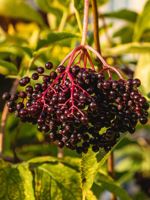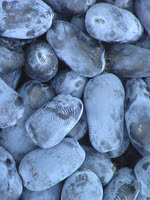Mon-Fri 9am - 5pm Mountain time
Indigo Treat Haskap (Honeyberry) vs Bob Gordon Elderberry
Sambucus canadensis Bob Gordon
Lonicera caerulea Indigo Treat
NOT AVAILABLE THIS SEASON - MIGHT RETURN
Bob Gordon Elderberry is a Black Elderberry cultivar that produces berries that are larger and sweeter than other varieties, making it one of the top cultivars. It produces large clusters of white flowers that turn into large clusters of dark purple to black berries. The berries are well-suited for baked goods, jams, jellies, and syrups. It was selected from the wild in Missouri.
The large berry clusters that the Bob Gordon Elderberry produces will often end up hanging downward. This makes it more difficult for birds to feed on the berries. If birds are a concern, this might be the right berry for you.
Black Elderberries are considered to be partially self-pollinating. So while they will still produce some berries without cross-pollination, planting with another variety will increase yields. Consider planting with Black Elderberry or Ranch Elderberry.
Warning: the seeds, stems, leaves, roots, and uncooked berries are toxic to humans when eaten in quantity. Berries should be cooked to make them safe for human consumption.
Indigo Treat has fruit similar in size and firmness to their Tundra variety, making it suitable for commercial production or your home garden.
Indigo Treat, like the Borealis Haskap, does not self-pollinate well. We recommend another variety, such as Honeybee or Berry Blue Honeyberry, be planted at a minimum 1:8 ratio with it to boost fruit production. Many experts suggest the highest Haskap yield comes from fields planted with the most varieties.
Due to stronger interest in newer cultivars, 2015 will be our last year selling Indigo Treat.
Bob Gordon Elderberry Quick Facts
Indigo Treat Haskap (Honeyberry) Quick Facts
Toxicity: leaves, stems, and uncooked berries are poisonous to humans

